What Happens After All About Spelling?
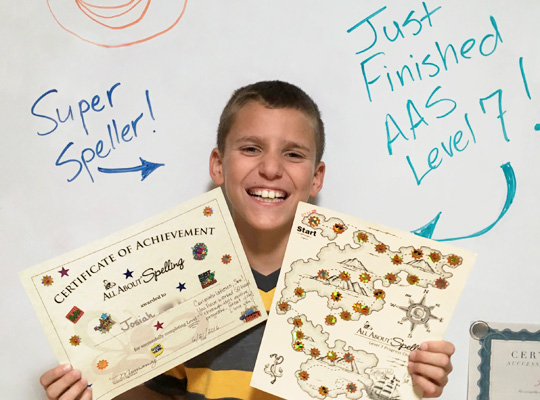
Whether your child has finished formal spelling instruction or you are just looking forward to that glorious day, this post will give you plenty of ideas of “what to do next.”
The first thing to do is to send me a note. Seriously! I love to hear from students who have completed the All About Spelling series (like our friend Josiah here).
Then after the high-fives and celebrating are over, you’re bound to ask the question,
Is that it? Does my child need to learn how to
spell any more words? Or are we completely done?
Pretend that the graphic below represents all the words in the English language. “Known Words,” represented by the inner circle, are those that your child can spell.
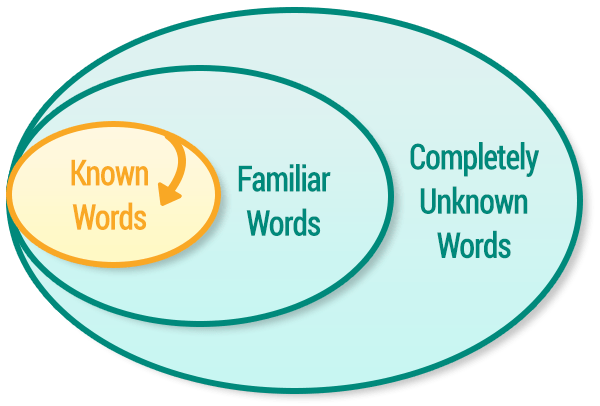
“Familiar Words” are those that are in his vocabulary, either his speaking vocabulary or his reading vocabulary. He knows what the words mean, but he’s never spelled them.
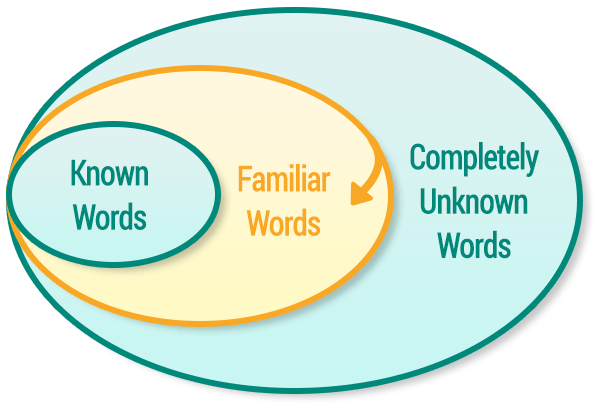
And then there are “Completely Unknown Words”—words that your child has never heard before or has never encountered in his reading.
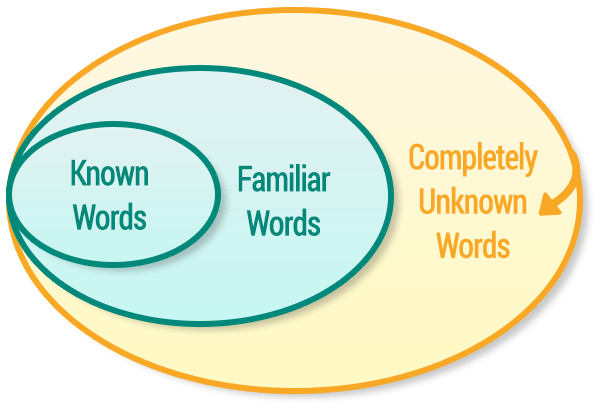
After completing the spelling program, your student will be able to spell at the high school level. But, obviously, there are many more words in the world! So I recommend that your child continue a self-directed, informal study of “Familiar Words.” These are the words that are found in the middle zone of the graphic. They are words that your child is more likely to see in print or to use in his own writing—which means that the words will be easier to learn and your child will be more motivated to learn them.
How to Find New Words to Learn
For years I kept a stash of index cards wherever I was likely to run across new words—next to a favorite reading chair, next to the computer, on the nightstand, or in a backpack—and I encourage students to do the same. When they come across a word that would be helpful to know how to spell, they can jot it down on an index card. If there isn’t a written example of the word, they should just spell the word as best they can and then verify the spelling later.
Here are some places your student can look for those new-yet-familiar words to learn:
- Books, newspapers, magazines: Encourage your student to be aware of words he reads that he isn’t sure he knows how to spell.
- Hobbies and interests: Many of the terms related to hobbies could present opportunities to explore the spelling of new words.
- Personal writing: We all run into words while we’re writing that we aren’t sure how to spell.
- Vocabulary words: If your child is studying vocabulary, those words can be added to the list.
After discovering new words to learn to spell, it’s time to analyse those words.
How and Why We Analyze New Spelling Words
After discovering new words to learn to spell, it’s time to analyze those words.
Students who have completed All About Spelling Level 7 are generally amazing at analyzing new words. After all, they’ve repeated the procedure for many lessons, gradually increasing the scope of the word analysis. But if you are new to the program, you may be wondering how to analyze spelling words.
Your child should begin the word analysis by dividing the word into syllables, then circling any part of the word that doesn’t say what he expects it to say. Then he should evaluate the word. Does the word end with a doubled consonant? He should ask himself why. Does the word end in Silent E? He should consider the jobs of Silent E and ask himself which job Silent E is performing in this word. Consider the syllable types that make up the word. By analyzing the new words, your child will be able to keep previously learned concepts fresh in his mind for future reference.
Also, by this point, graduates of the program know how to treat words like building blocks. What does that mean? Well, it is very likely that over half of the new words your child encounters will have prefixes, suffixes, and Latin and Greek roots. Students have learned that they can learn how to spell many words at once—and increase their vocabulary at the same time—by learning the most common word parts.
Word analysis helps the spelling “stick” in the student’s mind. The word becomes linked to other words with similar meanings or word patterns.
After discovering new spelling words and analyzing them, it is time for just a touch of review.
A System for Reviewing the New Spelling Words
The best way to continue to improve spelling is to keep reviewing. The review needn’t take long—just a few minutes a week goes a long way at this stage. And a Spelling Review Box or simple index card file box is the perfect tool for this.
The Level 7 Student Packet comes with three purple divider cards, especially designed for this stage, but feel free to substitute your own handwritten dividers. Label the dividers New Words, Review, and Mastered, and place the divider cards in the Spelling Review Box, along with some index cards and a small pen or pencil.
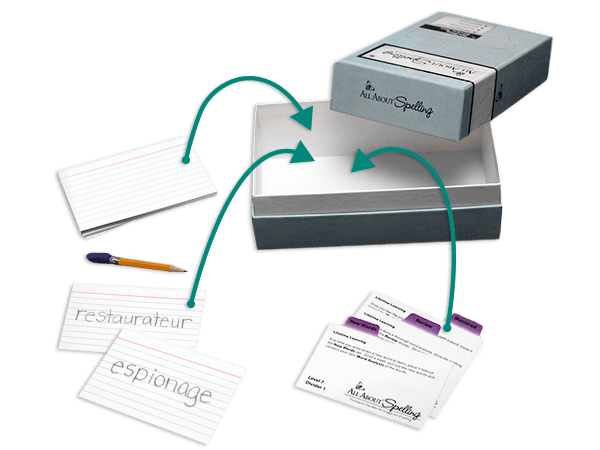
Now, any time there is a new word to learn, it goes behind the New Words divider. Once a week or so, your student can pull out the new words and conduct his own Word Analysis of them.
After the word analysis, the spelling words can be stored behind the Review divider. Then, several times a week, your child should set aside some time to practice spelling these words.
When he is sure that he won’t forget how to spell the words, your child can move reviewed words behind the Mastered divider. And he can watch that stack get thicker and thicker over the years!
Remember: This Is a Self-Guided Process
After you’ve explained the system, turn the responsibility over to your child. Ideally, he should choose the words that are important to him and schedule his own review time.
Our young friend Josiah just completed AAS Level 7 and is ready for lifelong spelling success! Josiah’s mom Carol recently sent us this wonderful note along with the photo of Josiah at the top of the page:
“Just wanted to share that my son (age 10) finished AAS Level 7 today! This has been a wonderful journey with your spelling program. My son has learned so much, and to be honest, so have I! It’s very important to my son to know the “why” behind things like math, spelling, the English language, science, etc. Your system introduced spelling in a way that kept it interesting and made sense. I recommend AAS to all my homeschool friends because I think it has got to be the best spelling program out there! Thank you so much for all you’ve done to create such a great learning tool!”
Is your student an AAS graduate? Or are you still looking forward to the day?
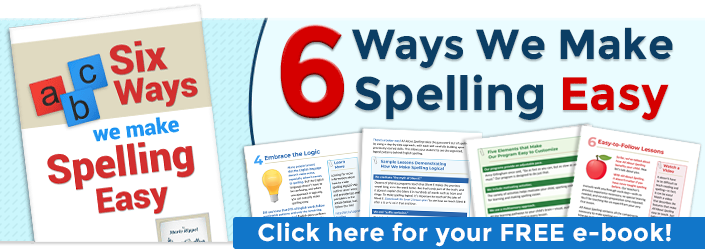




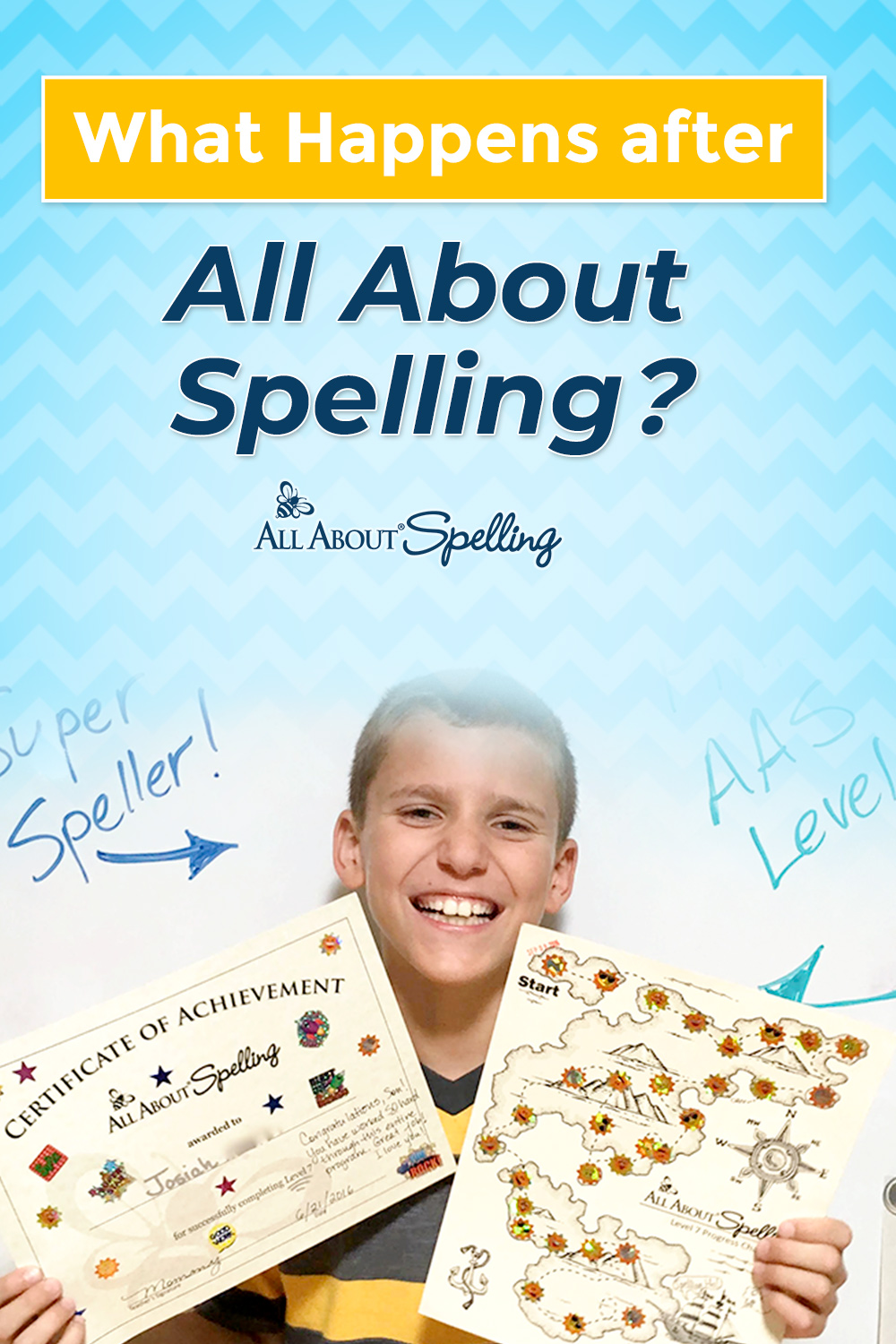






Heidi C.
says:Thank you for sharing this information! I’m not good at creating my own lessons or curriculum for school. Seeing and reading this example makes me excited to continue spelling with my older children! Thank you!
Robin E.
says: Customer ServiceYou’re welcome, Heidi! However, if you have questions just let me know.
Sally Chancellor
says:I am so eager to get there! My oldest has struggled so much with spelling, this program has been a lifesaver! She is just now halfway through level 4 in 7th grade, so we will definitely still be doing this in high school, but that is ok – we have seen so much amazing progress over the last 4 years with AAS.
Robin E.
says: Customer ServiceI’m so happy to hear that your child is doing so well with All About Spelling, Sally. A couple of my children have needed to be working in the higher levels of AAS in high school too. It’s worth it for the ease and confidence in writing that it gives them!
Jeanetta
says:What grade level does this go up to. I have a 9th grader and interested
Robin E.
says: Customer ServiceJeanetta,
All About Spelling takes students up through high school level spelling. The program teaches all of the words on the Ayres list (except a few which aren’t in common use anymore), which ranks words up to 12th grade, as well as words from other lists that are ranked between 9th and 12th grade.
However, the program is not a grade-level program. All About Spelling groups words in a logical manner based on similar rules or spelling patterns regardless of their supposed grade level, which allows students to progress quickly and confidently. All About Spelling is a building block program with each level building upon the previous one. The rules and concepts learned in Level 1 are applied in Level 2, and then those are applied in Level 3, and so on. Placement for spelling is based on the student’s knowledge of spelling rules and concepts rather than grade level, reading level, or the words a student has memorized. Most students actually start in Level 1 regardless of their grade level, but older students will go through the levels more quickly, especially the first few.
Our spelling placement test can help you determine if your student needs to start with Level 1, or if he or she could skip Level 1 and start with Level 2.
We encourage parents and teachers to “fast track” if the student knows how to spell most of the words but does not understand the underlying basic spelling concepts. In this case, very quickly skim the parts that the student already knows and slow down on the parts that he needs to learn. Pull out several words as examples. Make sure he understands the concept being taught and that he can demonstrate it back to you with the tiles or app, and then move on. This blog article on Using All About Spelling with Older Students has a good example of how you might fast track.
Our A Typical Day with All About Spelling blog post shows a teen student.
Let me know if you need more information or have questions. All About Spelling has been used with teens and even adult students with great success.
Stacy Whitaker
says:I love this post!! My kids all have varying degrees of dyslexia, so we take spelling very slowly. I love how well AAS follow the research on the science of reading!
Zena
says:Hello, I am just learning about your products. My son has different learning abilities and I have tried a number of programs. He is currently in the seventh grade, but he’s learning on a 2nd-grade level.
Robin E.
says: Customer ServiceDo you have any questions, Zena?
I think you will find our Using All About Spelling with Older Students blog post helpful. Let me know if you need more information.
Zena
says:Thank you for the information, Robin. Yes, does your program come with some online material that I can use with books?
Robin E.
says: Customer ServiceZena,
Well, there are no required digital components to All About Spelling, but we do have an optional interactive Letter Tiles app for tablets that takes the place of the physical letter tiles. You can see how the physical letter tiles and the app works in this blog post: Using Letter Tiles to Teach Reading and Spelling.
Kathryn Rossi
says:My dyslexic son really needs help w this
Robin E.
says: Customer ServiceKathryn,
Do you mean your son has completed All About Spelling but is still having difficulties with spelling? If so, please let me know either here or through our email at support@allaboutlearningpress.com.
Courtney Gibson
says:Just learning about your product and can’t wait to get started.
Robin E.
says: Customer ServiceDo you have any questions I can help you with, Courtney? Let me know if you need help with placement or anything else.
Tara
says:We are new to All About Spelling. Can’t wait to get started!
Robin E.
says: Customer ServiceLet me know if you have any questions or need help with placement or anything else, Tara.
Danielle Vardeman
says:Never heard of your product. It looks like a great addition to our homeschool work.
Robin E.
says: Customer ServiceThank you, Danielle! Do you have any questions or need more information?
Tera
says:Just learning of your product and I’m super excited about it so far and trying it out!
Robin E.
says: Customer ServiceIf you have any questions, Tera, or need more information, just let me know.
Carissa
says:My 2nd grader is catching up on her grade level for reading so we haven’t focused too much on spelling. Looking forward to using AAS when the time comes!
Bija Thomas
says:All about spellings seems to be the curriculum that we need
Karri
says:I haven’t used your system yet, but I am very impressed by the organization of your work, your website, and your free resources. I’ve used another program that follows the Orton -Gillingham approach, but I found it way too complicated for me.
Robin E.
says: Customer ServiceIt’s great to hear that you have found our website and resources appealing, Karri. We have multiple complete lessons for each level available as well. You’ll find them in our samples.
Please let me know if you have any questions or need more information about All About Reading and All About Spelling.
Aimee
says:I’ve had several friends recommend this program to me. I am hoping to add it to our homeschooling!
Angela Weiler
says:I’ve heard great things about this program! Hope to try it soon!
Georgia Ehrlich
says:This sounds like a great program that my kids would benefit from.
Robin E.
says: Customer ServiceThank you, Georgia! Do you have any questions or can I help you with placement or anything else?
Sunny H
says:Such great curriculum! Easy to follow and fun!
Kayce
says:Looks like an awesome program!
Robin E.
says: Customer ServiceThank you, Kayce!
Nancy Owen
says:We just got our AAS Level 1 package this week. I am excited to see how my son’s spelling skills will blossom. AAR has changed how my son reads, and I see improvement with each lesson!
Robin E.
says: Customer ServiceIt’s great to hear that your son is doing so well with All About Reading, Nancy! Thank you.
Paul Miron
says:I like the plan this article gives for findind and analyzing new words to learn. It makes it so much easier to apply and teach to kids. Thanks
Robin E.
says: Customer ServiceYou are welcome, Paul.
Dinah S.
says:Excited about this and my son really is looking forward to start!
Robin E.
says: Customer ServiceGreat, Dinah! Excitement about learning is a great way to start.
Debralee Taylor
says:Is there a mastery evaluation for after AAS 7 like there is for AAR 4?
Robin E.
says: Customer ServiceDebralee,
No, there is not, but I’m going to speak with our team about making one! Thank you for the idea.
Do you have any questions about All About Spelling level 7 or spelling mastery that I can help you with?
Debralee Taylor
says:I have an advanced 9-year-old. I was going to go through AAR4 with him but he blazed through the mastery test. Now I’m looking at the spelling levels & wondering if even those he would be beyond already.
Robin E.
says: Customer ServiceDebralee,
All About Spelling is specifically designed to help these groups of kids:
– Kids who need remedial spelling help, whether they are behind or struggle to keep up in spelling.
– Those who never learned the spelling rules.
– New beginning spellers, to prevent spelling problems.
An advanced speller may not need All About Spelling.
Students who are curious about why words are spelled the way they are often enjoy AAS, even if it is easy.
But here’s the issue: The levels and word lists in the All About Spelling program are arranged by concepts and spelling patterns rather than by grade levels. Each level builds upon the previous one. Your advanced child would need to start in Level 2 in order to get all of the rules and concepts taught in the program.
Level 2 of AAS focuses on learning the syllable types, when they are used and how they affect spelling. This information is foundational for higher levels of spelling. By the end of Level 2, students have learned 5 syllable types, and they learn the 6th in Level 3. For this reason, we don’t recommend starting higher than level 2.
If you decide to go this route, you can work as quickly as possible through Level 2. Your child doesn’t need to spell every word; just choose a small sampling of words and make sure that he understands *why* the words are spelled the way they are. You may be able to go through Level 2 and maybe 3 in less than a month each, but you will be laying a good foundation for more advanced spelling.
In order to get the phonogram cards that were taught in Level 1, you would need the student material packet for Level 1. If your child already knows all of the multiple sounds for each of the first 32 phonograms, you can skip this purchase. As an example, the letter A has three common sounds: /ă/ – /ā/ – /ah/, O has 4 sounds, CH has 3, S has 2, etc…. Your child will be drawing upon this knowledge throughout the series. (The Level 2 pack covers phonograms 33-43.)
I hope this gives you some ideas, but please let me know if you need more information.
Ali
says:Is it okay to correspond the level book to my child’s grade level? For example, cover Level 1 for 1st grade, cover Level 2 for 2nd grade, and so on? If Level 7 covers high school reading, I just see no need right now to rush through any of it or even cover it every single school day. Thanks for your help!
Robin E.
says: Customer ServiceAli,
You definitely have a point. If you are starting All About Spelling in 1st or 2nd grade, there is no reason to rush through the levels. You have plenty of time to cover all the material.
Just understand that the levels and word lists in the All About Spelling program are arranged by concepts and spelling patterns rather than by grade levels. Though many of the words presented in Level 1 are found on typical first-grade lists, other words in the same book can be found on typical fifth-grade lists. The method we use defies normal grade level classification, so our levels aren’t really grade levels.
As for not covering spelling every school day, many children do fine with doing spelling just three days a week or so. However, some children tend to forget too much between spelling lessons if they aren’t more consistent. Another option is to keep to a slow pace if your child needs more daily review is simply to do less time on some days. For example, you could just review some word cards or do a couple of dictation phrases on some days instead of a full 20 minutes.
I hope this helps, but please let me know if you have more questions.
Amy
says:Thanks, Robin! That does help!
Robin E.
says: Customer ServiceGlad to help, Amy! Let me know if you need anything else.
Amy
says:I’m not sure where to post this question, but I am curious if it is normal to slow down as we move through the All About Spelling levels. Maybe it is just my girls. They were early and excellent readers, and so by the time we started All About Spelling, they moved through the first two levels quickly and easily. But then one of mine (who naturally struggles with spelling, but not reading) needed us to slow down the pace some in level 3 and level 4. Level 5 seems to be taking a long time (it will take at least 15 months before we finish I think). And I have no idea how long the last two levels will take at this rate. Is there more content in these later levels? Or are the concepts typically more difficult to grasp? Or is it just us? :) I know we are fine, no matter how long it takes us. I think I am wondering mostly because I am a big planner by nature and I am wondering how long it will take us to finish. :) What would you say is typical for length of time to finish the last few books?
Robin E.
says: Customer ServiceAmy,
Most (probably all) students need more time for the higher levels than they need for the lower ones. The concepts are more difficult with more complex patterns and often no set rules for when to use one spelling over another. Knowing which syllable is accented and the Doubling Rule are especially difficult for my children!
It may encourage you to know that, at least for my kids although I know others that have experienced this too, level 5 is the longest. Level 6 and 7 pull everything together and move at least somewhat more quickly. But, as you said, it is fine no matter how long it takes as long as your students are mastering the content. Level 7 covers through 9th to 12th grade spelling, so there is plenty of time!
I hope this helps a bit. It is difficult to plan with All About Spelling, as you cannot know ahead of time how quickly or slowly individual children may progress. I would say to loosely plan a year per level for the higher levels, but as you have seen with level 5, it can go longer.
Let me know if you have further questions or need anything.
Katie O
says:This is a great post. It answered a question I didn’t even know I had yet! I love the application to learning new words.
Robin E.
says: Customer ServiceKatie,
We’re glad you found this helpful!
Deanna
says:Thank you for this information! I’d loved to use AAS with my children!
Kim
says:A friend told me about your program and we started using it this year and it has helped my 5th grader so much. Thank you!
Robin E.
says: Customer ServiceKim,
I started All About Spelling during the second half of my daughter’s 4th grade year, so I know about starting it with an older student. Have you seen our blog post on Using All About Spelling with Older Students?
Let us know if you ever have questions or need anything.
L Sell
says:Thanks for the info. My 5 and I have a chalkboard for the “word of the week” which usually comes from a new lit. book we are reading for the week. We post it so he can read it daily and learn it’s spelling. Thanks for the ideas, anything and everything helps!
Adriana Hook
says:Our school has used a different series that has bored the children for years now. After some research and lots of positive comments on a variety of websites and independent blogs I suggested it to our Curriculum Director. We’ve just ordered the Reading and Spelling sets for review and we are thoroughly excited about trying them out, especially with our struggling readers who are tired of “baby” books and want chapter books. From what I can see on-line, I have a feeling our parents will be thrilled to hear their children ask if they can read before bed time!
Robin E.
says: Customer ServiceAdriana,
I hope your students and teaches enjoy our books as much as so many parents and their children have! Please let us know if you have any questions.